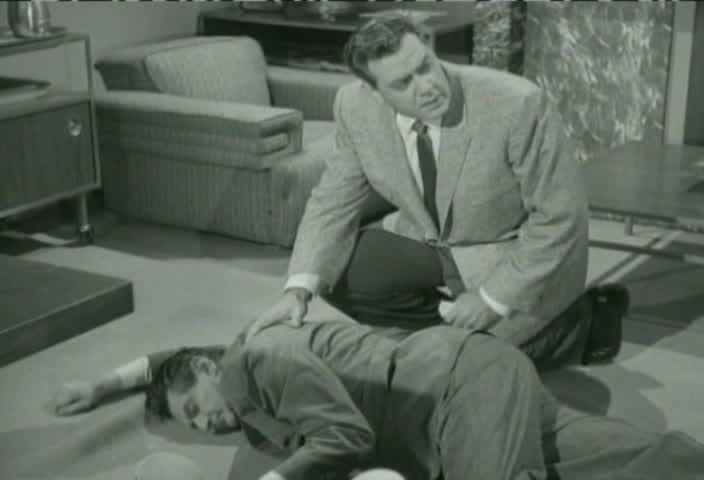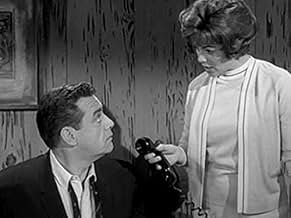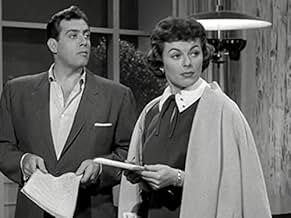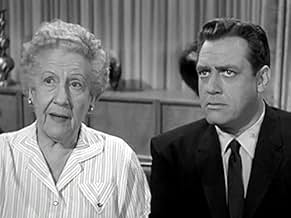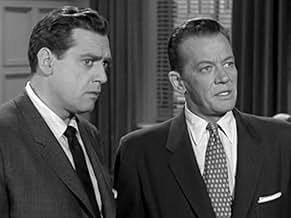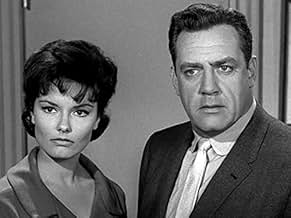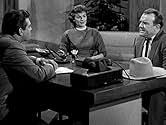I casi di un brillante avvocato difensore che si prende carico di imputati innocenti accusati ingiustamente.I casi di un brillante avvocato difensore che si prende carico di imputati innocenti accusati ingiustamente.I casi di un brillante avvocato difensore che si prende carico di imputati innocenti accusati ingiustamente.
- Vincitore di 3 Primetime Emmy
- 7 vittorie e 7 candidature totali
Sfoglia gli episodi
Recensioni in evidenza
The original "Perry Mason," in glorious black & white, is in the tradition of the great film noir films of the '40s and '50s. The cases have a poetic reality to them, clashing and understandable motives, psychology, and murder. Because the motives of all involved are understandable, there is not lacking a painful sympathy for those caught up in the circumstances described, even for the perpetrator. But there is a grim darkness to the program as well. The program gradually ran down during its life, so that, when it went off the air, it was probably time. The original 1957-1958 season was the best, with the most intricate plots and with Perry Mason a wiseguy thorn in the side of the police. The cast is perfect, and even the score fits perfectly this brooding and ironic look at life and fate.
10twanurit
One can tell the timeless longevity of a television series by the condition if it's still playing on TV. "Perry Mason" (1957-1966) is! It followed a tried-and-true formula: the first half-hour the situation is developed, then there's a murder. The second half-hour is filled with courtroom dramatics, to find the killer. But this is considerably heightened by a moody musical score, shadowy, gripping B&W photography, incisive scripts, magnificent guest stars (many who appeared multiple times), and lastly the brilliant ensemble cast headed by Raymond Burr, with Barbara Hale, William Hopper, William Talman and others. The series was re-done (poorly) in 1973, the more recent 2 hour TV movies were padded and don't hold up to repeated viewings. Voted the top dramatic series by TV Guide, it just does not get any better. Case closed.
Perhaps the most successful formula show in the history of TV. An interesting question is why, since the lead characters never varied, the outcome was predictable, and the plots could at times defy expert analysis. To me, that sounds pretty boring. So why did I faithfully watch the first runs and still catch the reruns when I can, and why did the series catch the fancy of so many others as it still does. Here are some conjectures.
Mason, Street, and Drake are more than a team-- they are a family. The chemistry among them is so good it's almost spooky. Burr's Mason is nothing if not masterful both inside the courtroom and out. He's a strong father-figure, while Hale's Della Street is the perfect secretary, sweet, attractive and highly efficient. Not quite a mother-figure (after all, this is a chaste family), she's the perfect older sister. And Hopper's Paul Drake is clever, charming, and slightly rakish. All in all, he's the perfect younger brother. Though each is a professional, together they operate as a loyal family unit. And when their final scene rolls around (The Final Fadeout, 1966), we're happy to know they will remain together even though we (the viewers) won't be with them.
The key here is Burr's grasp of character. After all, Mason wins week after week-- he never misses. What's more, he shows up the guardians of law and order week after week. If not done right, Mason would be an easy character to dislike. But Burr's Mason is never smug, never immodest, and always low-key, so we don't resent his near god-like status. This is a real tribute to Burr and the show's producers, who managed to walk a very fine line. There's one other character point worth noting. Mason's personality is the only one of the five (Burger and Tragg included) to alter. In the early episodes, he smokes, wears loud jackets, and occasionally flirts. But with the show's success, he's transformed into a paragon of virtue, probably because his character has come to stand for the quality of criminal justice in America. Shrewdly, the producers would take no chances with their golden egg.
The engaging quality of the stories varies little, an unusual feature for any formula show. That's likely because the script-writers worked with variations on six or seven basic plots. After all, they had to come up with thirty-plus mysteries every year for nine years. And each episode had to have a plausible list of suspects with a story line to unravel, which is a pretty heavy load. Then too, each entry had to have a larger than average cast of capable actors as suspects. Watching the re-runs, we see just about every familiar face from that era (one of the joys of catching the re-runs). Executive producer Gail Patrick Jackson deserves a lot of behind-the-scenes credit, since I'm sure this was not an easy series to put together week after week.
I had never thought of the show as film noir. But other reviewers have correctly pointed this out. Indeed, there are elements of noir in many of the first half hours, where the mystery sets up. Many of these were done in shadow, with strong emotions and a heavy atmosphere of doom, which distinguishes the series. For, overall, there was very little noir from any series during that sunny era. Frankly, it's that part I always enjoyed more than the courtroom scenes with their high-key lighting and extended dialogue. The general excellence of these first half- hours is another reason, I think, for the show's unusual success.
The mystery angle remains an attraction for many. It's fun, for those who want, to try to figure out the culprit. We know he or she will be exposed and the loose ends tied-up by hour's end. But the entries can be enjoyed for their drama alone. The witness-stand confessions served as a chance for neglected feature players to show their acting chops. Some of these were truly memorable. My favorite is from that great unsung actress of the era, Constance Ford. Watch her split personality emerge under Mason's perceptive grilling (The Case of the Deadly Double, 1958). It's a dramatic tour-de-force, as good as anything from the movies of the time. Many of the confessions were also poignant. The culprit could be seen as a sympathetic character, driven to murder by larger forces. And though, the epilogue (usually in Mason's office) often ended on a humorously upbeat note, the confessions remain the dramatic high point.
These are some of my best guesses. I expect there's another, not so flattering reason. Many of us, of course, have a nostalgic attachment to those younger years, which, I suppose, is only natural. Nonetheless, there is something timeless about the brave knight rescuing unfortunates in distress (in this case, usually a shapely blonde or brunette). In fact, the Mason show was predicated on that venerable premise. And even though Mason-as-ideal-defense-attorney would probably not work in today's post-Vietnam era, the key plot elements endure ( understandably, the series ended, just as the war in south-east Asia heated up). Greed, jealousy, ambition-- this is the stuff of high drama, while the Mason show used them effectively inside a format that fit its time. But the elements themselves remain timeless. And in that sense, so does the series.
Mason, Street, and Drake are more than a team-- they are a family. The chemistry among them is so good it's almost spooky. Burr's Mason is nothing if not masterful both inside the courtroom and out. He's a strong father-figure, while Hale's Della Street is the perfect secretary, sweet, attractive and highly efficient. Not quite a mother-figure (after all, this is a chaste family), she's the perfect older sister. And Hopper's Paul Drake is clever, charming, and slightly rakish. All in all, he's the perfect younger brother. Though each is a professional, together they operate as a loyal family unit. And when their final scene rolls around (The Final Fadeout, 1966), we're happy to know they will remain together even though we (the viewers) won't be with them.
The key here is Burr's grasp of character. After all, Mason wins week after week-- he never misses. What's more, he shows up the guardians of law and order week after week. If not done right, Mason would be an easy character to dislike. But Burr's Mason is never smug, never immodest, and always low-key, so we don't resent his near god-like status. This is a real tribute to Burr and the show's producers, who managed to walk a very fine line. There's one other character point worth noting. Mason's personality is the only one of the five (Burger and Tragg included) to alter. In the early episodes, he smokes, wears loud jackets, and occasionally flirts. But with the show's success, he's transformed into a paragon of virtue, probably because his character has come to stand for the quality of criminal justice in America. Shrewdly, the producers would take no chances with their golden egg.
The engaging quality of the stories varies little, an unusual feature for any formula show. That's likely because the script-writers worked with variations on six or seven basic plots. After all, they had to come up with thirty-plus mysteries every year for nine years. And each episode had to have a plausible list of suspects with a story line to unravel, which is a pretty heavy load. Then too, each entry had to have a larger than average cast of capable actors as suspects. Watching the re-runs, we see just about every familiar face from that era (one of the joys of catching the re-runs). Executive producer Gail Patrick Jackson deserves a lot of behind-the-scenes credit, since I'm sure this was not an easy series to put together week after week.
I had never thought of the show as film noir. But other reviewers have correctly pointed this out. Indeed, there are elements of noir in many of the first half hours, where the mystery sets up. Many of these were done in shadow, with strong emotions and a heavy atmosphere of doom, which distinguishes the series. For, overall, there was very little noir from any series during that sunny era. Frankly, it's that part I always enjoyed more than the courtroom scenes with their high-key lighting and extended dialogue. The general excellence of these first half- hours is another reason, I think, for the show's unusual success.
The mystery angle remains an attraction for many. It's fun, for those who want, to try to figure out the culprit. We know he or she will be exposed and the loose ends tied-up by hour's end. But the entries can be enjoyed for their drama alone. The witness-stand confessions served as a chance for neglected feature players to show their acting chops. Some of these were truly memorable. My favorite is from that great unsung actress of the era, Constance Ford. Watch her split personality emerge under Mason's perceptive grilling (The Case of the Deadly Double, 1958). It's a dramatic tour-de-force, as good as anything from the movies of the time. Many of the confessions were also poignant. The culprit could be seen as a sympathetic character, driven to murder by larger forces. And though, the epilogue (usually in Mason's office) often ended on a humorously upbeat note, the confessions remain the dramatic high point.
These are some of my best guesses. I expect there's another, not so flattering reason. Many of us, of course, have a nostalgic attachment to those younger years, which, I suppose, is only natural. Nonetheless, there is something timeless about the brave knight rescuing unfortunates in distress (in this case, usually a shapely blonde or brunette). In fact, the Mason show was predicated on that venerable premise. And even though Mason-as-ideal-defense-attorney would probably not work in today's post-Vietnam era, the key plot elements endure ( understandably, the series ended, just as the war in south-east Asia heated up). Greed, jealousy, ambition-- this is the stuff of high drama, while the Mason show used them effectively inside a format that fit its time. But the elements themselves remain timeless. And in that sense, so does the series.
Perry Mason is one of the finest shows (courtroom or otherwise) that was ever made. A memorable cast, great scripts, and always a surprise in the courtroom. I watched the shows for years and years in re-runs. Being blessed with a poor memory, I could usually be depended on to forget the final outcome of the trials. There were quite a few shows and guest starts to keep track of. One "highlight" of my life was to get onto a murder trial jury myself during some of my more intense Perry Mason years.
The thing that separated 'Perry' from other shows was it's compactness. It was all story. Personal relationships were hinted at, but took up little time on the screen. If some errand needed to be run, Paul Drake (the detective) would appear with the information in the next scene. Nor car chases, no fistfights, and no love interest in every episode. JUST STORY. I've heard this is one reason Raymond Burr gave up the show. The show was so dependant on him in just about every scene that he had to live on the studio lot in a trailer during filming (and that was most of the year).
In contrast, later 'Perry Mason' attempts HAD the aforementioned elements. There were car chases, fist fights, and Paul Drake Jr. was allowed much screen time for these and to win over the girl too. We got to see all the painstaking effort to get the information his dad just seemed to pull out of the air.
It was good to see Perry back, and I did watch. The 'newer' shows paled by comparison to the all-time classic original. But, it's tough for anything to live up to our memories.....
PS- I even sang along to the very recognize-able theme with lyrics of my own.......
The thing that separated 'Perry' from other shows was it's compactness. It was all story. Personal relationships were hinted at, but took up little time on the screen. If some errand needed to be run, Paul Drake (the detective) would appear with the information in the next scene. Nor car chases, no fistfights, and no love interest in every episode. JUST STORY. I've heard this is one reason Raymond Burr gave up the show. The show was so dependant on him in just about every scene that he had to live on the studio lot in a trailer during filming (and that was most of the year).
In contrast, later 'Perry Mason' attempts HAD the aforementioned elements. There were car chases, fist fights, and Paul Drake Jr. was allowed much screen time for these and to win over the girl too. We got to see all the painstaking effort to get the information his dad just seemed to pull out of the air.
It was good to see Perry back, and I did watch. The 'newer' shows paled by comparison to the all-time classic original. But, it's tough for anything to live up to our memories.....
PS- I even sang along to the very recognize-able theme with lyrics of my own.......
For nine seasons and over 250 episodes Perry Mason ruled the television roost, it was the ratings flagship for CBS. Saturday nights at 7:30 this show was a viewing requirement in my household.
The show had a built in audience from the start with the millions of mystery fans who loved Erle Stanley Gardner's criminal defense attorney who always defended the innocent and never lost a case. Those parameters for the television series had to be respected. But also the right actor had to be found to play Mason.
One of the highest pieces of praise I ever read was Erle Stanley Gardner himself saying that Raymond Burr completely fitted his concept of the character he created. When you've got that kind of endorsement as well as the ratings to back it up, I'm sure the show could have run forever.
A really solid group of character players made up the cast here. Take a look at the credits on the pages here for Burr, Barbara Hale as Della Street, William Talman as District Attorney Hamilton Burger, William Hopper as Perry's private detective Paul Drake and Ray Collins as Police Lieutenant Tragg seem like they appeared in some of the best movies ever before going to series television.
Collins began experiencing health problems and first Wesley Lau and later Richard Anderson took the load from him. When Collins died in 1965 Anderson was the official cop for the series last year.
So indelible an impression this cast made on viewers minds that when CBS sought to revive Perry Mason in the middle seventies with a younger cast, the public viewed other stations in droves. Even with Collins, Hopper, and Talman all gone at that point, no one would accept their replacements.
The writers given the constraints of an hour television show managed to respect Erle Stanley Gardner's parameters and did a beautiful job with each and every episode.
This is what a good television series is all about.
The show had a built in audience from the start with the millions of mystery fans who loved Erle Stanley Gardner's criminal defense attorney who always defended the innocent and never lost a case. Those parameters for the television series had to be respected. But also the right actor had to be found to play Mason.
One of the highest pieces of praise I ever read was Erle Stanley Gardner himself saying that Raymond Burr completely fitted his concept of the character he created. When you've got that kind of endorsement as well as the ratings to back it up, I'm sure the show could have run forever.
A really solid group of character players made up the cast here. Take a look at the credits on the pages here for Burr, Barbara Hale as Della Street, William Talman as District Attorney Hamilton Burger, William Hopper as Perry's private detective Paul Drake and Ray Collins as Police Lieutenant Tragg seem like they appeared in some of the best movies ever before going to series television.
Collins began experiencing health problems and first Wesley Lau and later Richard Anderson took the load from him. When Collins died in 1965 Anderson was the official cop for the series last year.
So indelible an impression this cast made on viewers minds that when CBS sought to revive Perry Mason in the middle seventies with a younger cast, the public viewed other stations in droves. Even with Collins, Hopper, and Talman all gone at that point, no one would accept their replacements.
The writers given the constraints of an hour television show managed to respect Erle Stanley Gardner's parameters and did a beautiful job with each and every episode.
This is what a good television series is all about.
Lo sapevi?
- QuizWhen Raymond Burr missed several episodes due to illness, he was replaced by several guest attorneys who were played by Bette Davis, Walter Pidgeon, Hugh O'Brian, Michael Rennie, and Mike Connors.
- BlooperPerry Mason's office is given as on the 9th floor of the fictional "Brent Building" in Los Angeles, and has a distinctive terrace outside (as does the next-door office in S.8 Ep. 30). However, establishing shots of the exterior use a photo of a plain-sided office building with no balconies or terraces on the 9th floor, or anywhere else.
- Citazioni
Hamilton Burger: Incompetent, irrelevant, and immaterial!
- ConnessioniFeatured in Masquerade (1967)
I più visti
Accedi per valutare e creare un elenco di titoli salvati per ottenere consigli personalizzati
Dettagli
- Data di uscita
- Paese di origine
- Lingua
- Celebre anche come
- Перрі Мейсон
- Luoghi delle riprese
- Aziende produttrici
- Vedi altri crediti dell’azienda su IMDbPro
- Tempo di esecuzione
- 1h(60 min)
- Colore
- Mix di suoni
- Proporzioni
- 1.33 : 1
Contribuisci a questa pagina
Suggerisci una modifica o aggiungi i contenuti mancanti

